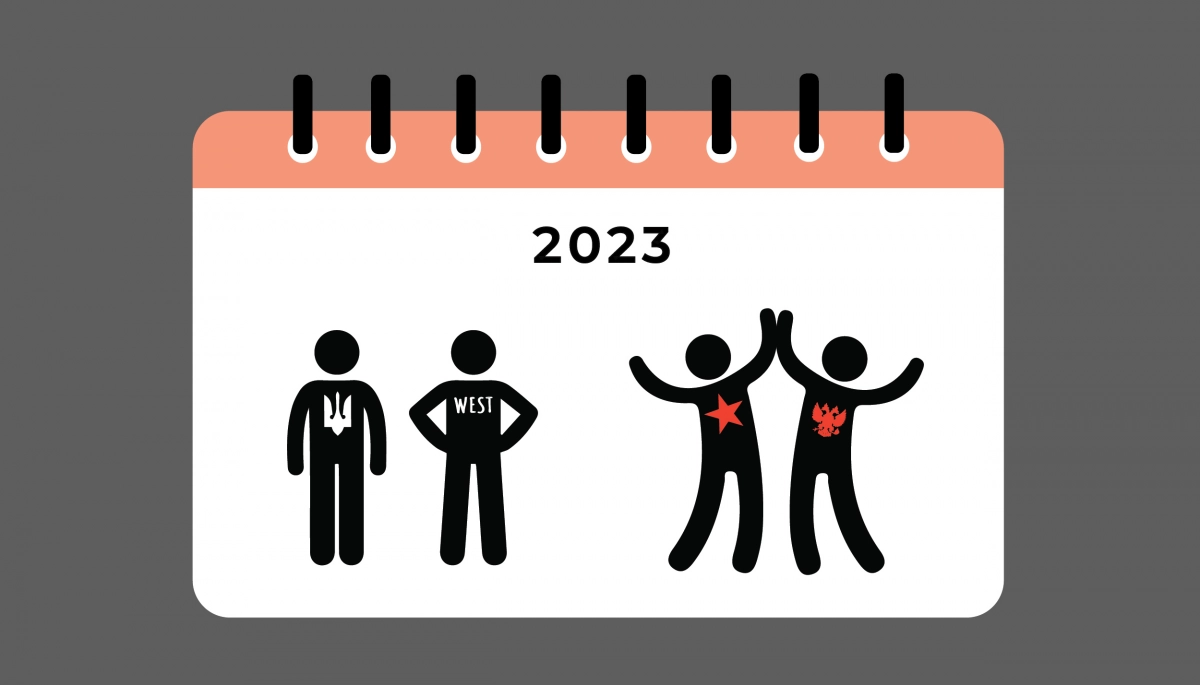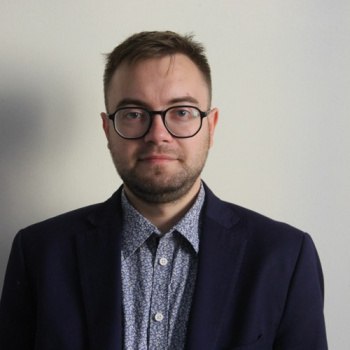Українською читайте тут.
Detector Media sums up the media year 2023 with a traditional review of critical events and trends in the media world.
Read more about this year under the tag "#Results of the year 2023". We have already singled out the main topics, messages, fakes, and manipulations created by the Kremlin from December 1, 2022 to December 1, 2023, provided the assessment of the Ocean Media Plus groups and agencies of the television market of Ukraine according to their television budgets for the year, and reviewed how leading foreign media discussed Ukraine on their covers not only in 2023, but for all 20 months of the full-scale war in Ukraine, assessed what pro-Russian Telegram channels predicted for this year and what they predict for 2024, and mentioned the main events on the media market for the past year.
Similarly, DM will analyze what Russian propaganda tried to surprise us with in 2023.
Russia, striving to change the existing world order, uses information as a weapon, spreading its propaganda in all regions of the world. Russia manipulates public opinion about Ukraine abroad, portraying Ukrainians as Nazis and Ukrainian refugees as alleged social assistance parasites in Europe.
Therefore, the central thesis of Russian propaganda, especially in NATO countries, was that Ukraine has been forgotten and less supported. Instead, Western countries seem to think more about the Middle East due to the start of the war and the Hamas attack on Israel on October 7, 2023.
In Russian propaganda’s imagination, African states were supposed to remain friends and allies of Russia. Therefore, the second Russia-Africa summit in St. Petersburg in July 2023 was supposed to demonstrate solidarity with Moscow.
A separate position in Russian propaganda is given to China as a friend of Moscow. More cooperation between the Russian Federation and the People's Republic of China is presented as a victory by [Russian] agitational propaganda. However, China, similarly to Russia, spreads its own propaganda against the West. However, despite positive rhetoric about China in the Russian media, Beijing does not perceive Russia as an equal partner and even more so as an ally.
In 2023, Russia influenced election races (Slovakia, Poland, Argentina, and the Netherlands) worldwide. It has already been a traditional tactic of Russia to interfere in the internal affairs of other states through politicians and the media to be able to change the opinion about Ukraine. After the elections, Russian agitational propaganda either encouraged the election of the appropriate candidate or discredited the politician due to their desire to continue supporting Ukraine.
DM provides a brief overview of Russian propaganda’s trends in the world in 2023.
For Russia, NATO is the primary propaganda bogeyman, which is responsible for everything wrong happening in the world: wars, coups, political destabilization, etc. From the Russian perspective, it is the North Atlantic Alliance that is fighting against Russia using Ukrainians. This view remained the key one [for Russian propaganda] in 2023.
On the eve of and during the NATO summit in Vilnius, which took place in July 2023, Russian propaganda stated that "Ukraine will not be included in the Alliance". In general, the West allegedly adheres to the strategy of "fighting to the last Ukrainian". By claiming so, the Russian propaganda explained the delay in providing Ukraine with military aid from NATO countries.
Elections in the world, in particular in NATO countries, became a reason for intensifying Russian propaganda there. At the end of September, Robert Fico won the parliamentary elections in Slovakia due to the anti-American sentiments present in the Slovak public space, and the October elections in Poland were preceded by a campaign to inflame the conflict surrounding the blocking of Ukrainian grain shipments by Polish carriers. Pro-Russian Telegram channels used the scandal, creating a negative impression that the blocking of Ukraine's border by Poland and Slovakia meant the end of Ukraine's European integration.
Read also:
· A friend of Ukraine fascinated by Russian narratives: alarming election results in Slovakia
· Orthodoxy, Liberator Russia, Kusturica. How Russian propaganda operates in the Balkans
The Freedom Party, led by Geert Wilders, won the elections in the Netherlands in November 2023. Due to his similar hairstyle and populism, he is called the "Dutch Trump". Politically, Wilders is a Eurosceptic and opposes Islam. Due to Russian propaganda’s efforts, in 2016, during the referendum on the Association Agreement between Ukraine and the EU in the Netherlands, the majority voted "against" [the signing of an agreement]. Then Geert Wilders called a referendum "the beginning of the end of the European Union".
However, since a government coalition still needs to be formed, Wilders' influence on decision-making will be compensated by other parties. Therefore, there is no threat of decreased support for Ukraine from the Netherlands. It was assured by the Minister of Foreign Trade of the Netherlands, Geoffrey van Leeuwen, in an interview with The Kyiv Independent: "I am sure that whatever [Dutch one — DM’s note] government we get, there will be huge support for continuing our policy of supporting Ukraine."
According to the US State Department, in 2023, Russia financed information campaigns in Latin America to fuel anti-American sentiment, as well as public opinion in Latin American countries against NATO and to reduce support for Ukraine. Agents involved in the process of Russian disinformation in Latin America are the Social Design Agency, the Structure, and the Internet Development Institute.
Russia now mimics, passing off its agents of influence as "independent news resources." According to the report’s authors, such sites spread conspiracy theories. These trends further confirm that Russia manipulates freedom of speech in the world, presenting its narratives as an alternative to what can be read in the mainstream media.
According to the study of the dynamics and development of Russian propaganda in 2014–2023 by Aspenia Online, the structure of the current agitational propaganda looks like this: state media, non-governmental organizations, the church, the "troll factory", the sphere of education, politicians, diplomats, and celebrities.
In Africa, Russia continued its practice of destabilizing the situation, using mercenaries from the "Wagner group", which the Ukrainian parliament recognized as an international criminal organization. Moreover, the organization of coups in African countries was accompanied, in particular, by the involvement of cyber bot farms. After Prigozhin's "rebellion" in the summer of 2023, followed by his death, Wagner's influence on African affairs decreased but by no means disappeared.
According to the European Digital Media Observatory and Africa Check, Russian propaganda in Africa has focused on the following claims. First, "Russia has significant support in Africa and vice versa." Russia wants to show itself as the "new USSR" in terms of helping Africans, but Moscow's influence (in particular, informational one) on Africa is not as comprehensive as it seems.
The second claim is that Russia is an influential power because of its nuclear weapons. This thesis is designed to intimidate African countries into supporting Ukraine. The third thesis concerns the fact that Ukrainians are Nazis. Therefore, the Russians fabricated relevant photos and video "pieces of evidence" of this claim.
Russian propaganda is active in the Middle East through Sputnik Arabic and RT Arabic. Moscow exploits the Soviet experience of influencing the Arab states during the Cold War when the USSR provided military aid to fight against Israel, as well as money for infrastructure.
According to the Washington Institute for Near East Policy analysis, Russia promotes its narratives in the Middle East through regional media outlets that take news from Russian propaganda channels. The Arabic news resource Nabd republishes RT Arabic.
When Hamas attacked Israel on October 7, 2023, all the attention of the world media shifted from Ukraine to the Middle East. An analysis of this topic has already been published by Detector Media, in particular, about "what is happening in Israel is the USA’s fault", "Ukraine will not be supported because the USA will provide aid to Israel", manipulation of the migrants’ topic, with which Russia intimidated the European Union, as well as the conspiracy theory about the "Heavenly Jerusalem", according to which there seems to be a plan for the mass resettlement of Jews to the south of Ukraine.
At the same time, Israel was not the only subject of Russia's information manipulation in the Middle East. Russian President Vladimir Putin visited the United Arab Emirates in early December 2023 as part of the 28th UN Conference of Parties on Climate Change, held in Dubai from November 30 to December 12, 2023. Russian propaganda presented this visit as a victory — diplomatic isolation of Russia does not exist, and Putin is an influential politician who conducts negotiations with world leaders. However, Russia is manipulating the climate agenda to increase exports of oil and gas (fossil energy sources) abroad, particularly to the Middle East.
Russia has several vital allies in the paradigm of Russian propaganda, mainly China. Both states are fighting against "US hegemony" and "NATO expansion".
Two crucial events in Russian-Chinese relations took place in 2023: Xi Jinping's visit to Moscow in March and Vladimir Putin's participation in the One Belt One Road project forum.
The Diplomat publication’s report emphasized the significant role of Russian state media in covering Xi's visit to the Russian capital in March. Thus, Russia 24 [propagandist media] launched the second season of the TV program "Favorite Quotes of Xi Jinping." It is a joint project with China Media Group and the Propaganda Department of the Communist Party of China. Moreover, there are branches of the PRC’s leading state media in Russia: Xinhua, CGTN, and People's Daily.
In every possible way, Russian propaganda emphasized the strong friendship between Russia and the People's Republic of China, praising the leadership qualities of Putin and Xi — such rhetoric results from cooperation between the two countries' leading state media. Since 2017, the Chinese-Russian media forum has been held annually. During Xi's visit in March, Xinhua and TASS renewed the agreement on bilateral cooperation, and a memorandum was signed between the China Media Group and Rossiyskaya Gazeta [Russian Newspaper].
A separate panel was devoted to disinformation at the 9th annual Strategic Choices in Europe conference (November 27-28, 2023) by Chatham House, Konrad Adenauer Foundation, and Kiel University Institute of Politics.
Alex Krasnodomskiy, Yakub Kalenskiy, Simona Kozhokaru, Tamar Kintsurashvili, and Nino Macharashvili at the "Strategic European Elections" conference
During the conference panel, ForSet co-founder and director Nino Macharashvili spoke about the growing role of artificial intelligence as a tool of Russian propaganda in the world: "The problems with AI will become even more widespread. Civil society and creative studios should be involved to solve them."
Macharashvili mentioned the project Mantis Analytics, with which one can detect threats in the information space and protect oneself against them.
The executive director of the Media Development Foundation, Tamar Kintsurashvili, said it is essential to "build sustainability under conditions when there are such personalities as Tucker Carlson, who stated that The USA declared jihad against Russia. Psychological operations are quite dangerous because, during them, Russians manipulate human emotions and feelings."
Realizing that Russian disinformation has no state or technological borders, Ukraine should focus more on forming its own strategic narratives. Debunking fakes is excellent, but only as part of the more extensive work of information policy abroad. Russia aims to control the global information space, imposing its own agenda. The 2023 events in the international arena showed that it is time to adapt to the latest realities, which involve a more strategic analysis of the enemy's actions and goals in different regions of the world.
Photo credits: Chatham House
Infographic: Natalia Lobach



